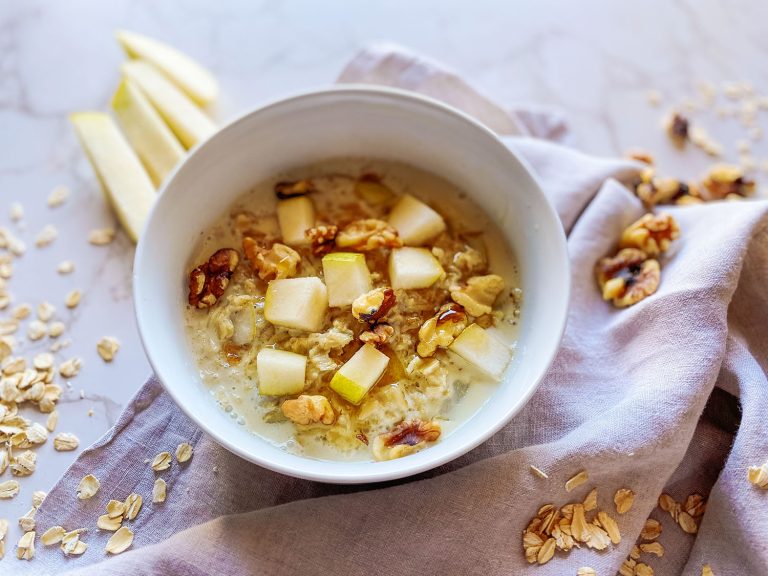I’m sure you’ve heard it before — 30 minutes of exercise five days a week is all you need to reap the benefits of exercise. In practice, that sounds great. But what happens when that pesky acid reflux stops by to say hello?
Exercise can very often cause or worsen acid reflux or GERD. That said, you aren’t without options. We put together a list of strategies and tactics to help avoid acid reflux when running. Or, at the very least, limit its effects so you can still get your 30 minutes in for the day.
What Causes Acid Reflux During Exercise or Running?
Exercise-induced GERD is actually fairly common in athletes and people trying to get their daily dose of exercise. According to WebMD, if the LES muscle (the lower esophageal sphincter) is weak or too relaxed, your food or stomach acid “burps” back up into your esophagus.
“There are certain activities that can trigger reflux, and exercise is one of them,” says Sumona Saha, MD, a gastroenterologist and assistant professor of medicine at the University of Wisconsin School of Medicine. Although exercise can often trigger acid reflux, there are plenty of strategies to help limit the discomfort. Below is a list of ten effective strategies to help you reduce acid reflux discomfort and get back to exercising.
10 Strategies to Fight Back When Your Acid Reflux Flairs Up
1. Can sports drinks cause acid reflux?
According to a clinical trial run by The Internal Journal of Sports Medicine, the use of sports drinks while running leads to a higher incidence of both upper and lower GI complaints than water.
The problem with drinks like Gatorade, Nuun, or Powerade is that they contain high amounts of citric acid, which can cause or worsen acid reflux. Avoiding sports drinks several hours before or during your workout can help curb the potential for acid reflux.
2. Stick with water
The best option for hydrating during a run is pretty old-fashioned: water. If you frequently struggle with acid reflux, you should only stick to water before and during exercise. Limiting the amount of citric acid while exercising will help curb any potential for discomfort.
However, if you feel that a little extra hydration is needed, try mixing coconut water powder with water. Packed with essential electrolytes that will help hydrate your body faster, coconut water powder contains no added sugar and minimal citric acid. Just coconuts and pure hydration!
3. Avoid Coffee
Acidic foods and drinks will often worsen acid reflux. Try your best to avoid coffee for at least two hours before running or exercising. Limiting your diet’s acidity before a workout will help reduce the amount of discomfort experienced during it.
If avoiding coffee is just too difficult, and you need that extra caffeine boost to get amped for a workout, try low-acid coffee like Tres Hermanos Organic. It’s delicious, responsibly harvested, and contains significantly less acid than your average “cup of joe.”
4. Timing your meals
Eating a large before a workout is a major risk for acid reflux. A small snack is fine, but a large meal will inevitably come back to haunt you. If you know you’ll be exercising or running, avoid any large meals for two to three hours before. This will give your body time to digest and limit the potential for discomfort while exercising.
Additionally, avoid high acidic foods that are often the culprit of acid reflux. Some common examples include tomatoes and tomato-based foods, citrus, chocolate, coffee, and fried or fatty foods.
5. Can fasting help with acid reflux?
The short answer is — possibly. There’s a strong association between the foods you consume and heartburn. Remove food from the equation, and acid reflux or heartburn becomes much less likely.
The Houston Heartburn and Reflux Center writes that “During fasting, stomach secretion of ghrelin, the hunger hormone, increases. A study has shown that there is an inverse relationship between ghrelin blood levels and heartburn. Thus, fasting may be associated with GERD symptom improvement and less acid reflux events.”
All this to say, if you’re planning to exercise, try fasting two to three hours in advance. The less you have in your stomach, the less likely you are to experience acid reflux irritation.
6. Limit your carbohydrate intake
A low-carb diet is a popular solution for many people suffering from GERD and other digestive issues. According to a study done by the American Gastroenterological Association, certain carbohydrates can increase the number of acid reflux episodes and GERD symptoms.
If you’re struggling to control your acid reflux when exercising, try reducing the amount of carbohydrates you eat before working out. Everyone’s body is a little different, so this may not work for everyone. Nonetheless, limiting the amount of carbs can potentially alleviate a significant amount of symptoms experienced as a result of acid reflux.
7. Strengthen your lower esophageal sphincter (LES) muscle
According to research published in the European Review for Medical and Pharmacological Sciences, breathing exercises focused on strengthening the LES muscle can help those suffering from chronic acid reflux.
Five separate breathing exercises were used in the study — two focusing on supine abdominal breathing, moving the abdominal wall while relaxing thorax and lower intercostal muscles. The other three focused on seated and standing inspiratory training with slow expirations.
8. Tapping Solution App
Stress and anxiety is another trigger for acid reflux. According to Healthline, “Stress, coupled with exhaustion, may present even more body changes that lead to increased acid reflux.”
One simple fix is the Tapping Solution App — a meditation technique that has been proven to calm the nervous system, rewire the brain to respond in healthier ways, and restore the body’s balance of energy. By reducing your stress levels, you can potentially reduce the discomfort experienced as a result of acid reflux.
9. Hilma Supplements
Hilma upset stomach relief tablets are clinically proven to relieve your upset stomach and promote digestion. Made from Chamomile, Artichoke Leaf, Ginger Root, and other natural ingredients, Hilma supplements are great for combatting the occasional heartburn, acid indigestion, or upset stomach.
If you’re experiencing major discomfort, these tablets might be the solution. In a clinical study, 94% of participants saw a decrease in feelings of an upset stomach after just 30 minutes.
10. Talk to your doctor
Self-experimentation can only take you so far. If your symptoms progressively get worse, talk to your doctor immediately. They will be able to more effectively diagnose your symptoms and root-out the cause of your discomfort while exercising.
Final Thoughts
From the weekend warrior to elite athletes, acid reflux is something that has plagued everyone. That said, you don’t have to let acid reflux keep you from exercising. Armed with these 10 powerful strategies, you can control or avoid acid reflux altogether. And hopefully, get back to doing what you love to do.




